Expert Interview
A Dangerous Moment in U.S.-China Relations
by Rachel Lietzow, Sonia Tan, Ted Enberg, Qiao Ye, Masters candidates, UC San Diego School of Global Policy and Strategy
|
|
|
|
Background
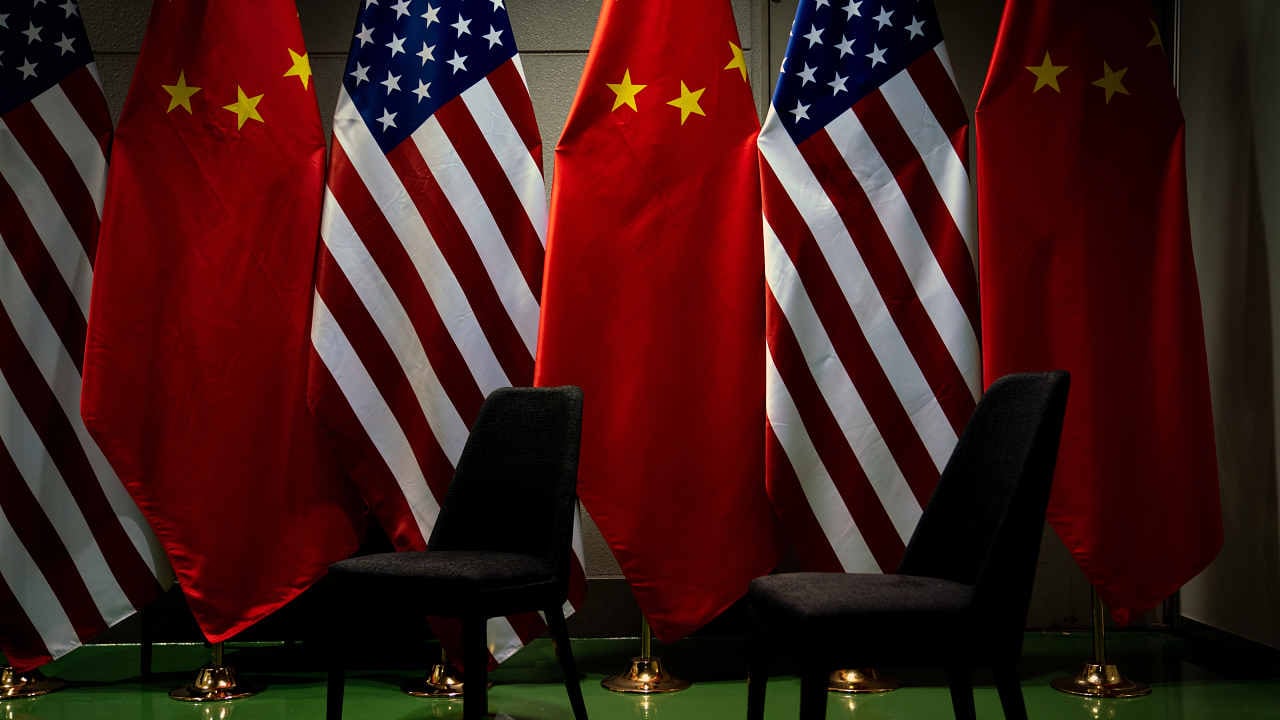 A series of tit-for-tat moves by the U.S. and China – the forced closure of consulates; the latest sanctions on Chinese officials for human rights violations and China’s retaliatory sanctions on U.S. senators; the trade war; reduced bilateral diplomatic efforts; and the increased tensions over the South China Sea – have aggravated the downturn in U.S.-China relations. What role do domestic factors play in the deteriorating U.S.-China relationship? Has the United States’ China policy been effective, and will it change with a change in administrations? We invite Prof. Susan Shirk and Prof. Erin Carter to provide their insights.
A series of tit-for-tat moves by the U.S. and China – the forced closure of consulates; the latest sanctions on Chinese officials for human rights violations and China’s retaliatory sanctions on U.S. senators; the trade war; reduced bilateral diplomatic efforts; and the increased tensions over the South China Sea – have aggravated the downturn in U.S.-China relations. What role do domestic factors play in the deteriorating U.S.-China relationship? Has the United States’ China policy been effective, and will it change with a change in administrations? We invite Prof. Susan Shirk and Prof. Erin Carter to provide their insights.
How have domestic factors influenced recent policies enacted by the American and Chinese governments toward each other, and what effects do they have on bilateral relations?
Carter: It is important to realize that we are in a real danger zone between now and the U.S. presidential election in November. This is because both Xi Jinping and Donald Trump face very strong domestic pressures, which incentivizes conflict and increases resistance to backing down on both sides. That creates a very dangerous and unique situation for the United States and China.
On the Chinese side, Xi Jinping faces a variety of unique pressures. The most obvious is the early Chinese Communist Party response and cover-up of COVID-19, which created considerable backlash in China. According to economist Li Gan, who was hosted in a recent 21st Century China Center webinar, peri-urban unemployment in China is actually much higher than conventionally understood. This is a huge source of dissatisfaction among the Chinese public, as the “autocratic social contract” in China is that the regime provides growth in exchange for autocratic rule. Xi Jinping’s indefinite extension of term limits and increasing repression have also created discontent.
Xi’s crackdown on corruption has also caused anger within the party. Historically, becoming a CCP political elite conferred a route to becoming wealthy, and corruption was commonly a part of that. Xi Jinping’s policies have denied officials these traditional access points to rents and financial welfare. Elites have been even angrier because the anti-corruption campaign has been politically motivated, targeting many of Xi Jinping's enemies.
You can see domestic pressures in recent elite-level criticisms of Xi Jinping. In February, [real estate tycoon and former party chief of a state-owned enterprise] Ren Zhiqiang described Xi Jinping's response to COVID-19 as “clownish” and Xi as an “emperor without any clothes.” This is an incredible level of criticism within an authoritarian context. Ren is not only well-connected within the party but also very popular with the public, with 37 million social media followers. These factors make him a unique individual who can credibly challenge Xi’s authority. Interestingly, right after Ren made such a statement, a flurry of other elites made similar statements or expressed support for Ren. I think that contextualizes why Xi Jinping recently expelled him from the Party, because that sort of criticism is very powerful.
All this suggests that there are tremendous pressures on Xi Jinping, and he is much less popular than conventionally assumed. In June, my co-author Brett Carter and I ran a large-scale, nationally representative survey in China, which had 4,000 responses. We used a technique that significantly decreased the likelihood of preference falsification to assess different levels of regime support. We found that the level of Chinese public support for the CCP is only around 60%, definitely not the 90% concluded by many other surveys that used direct questioning.
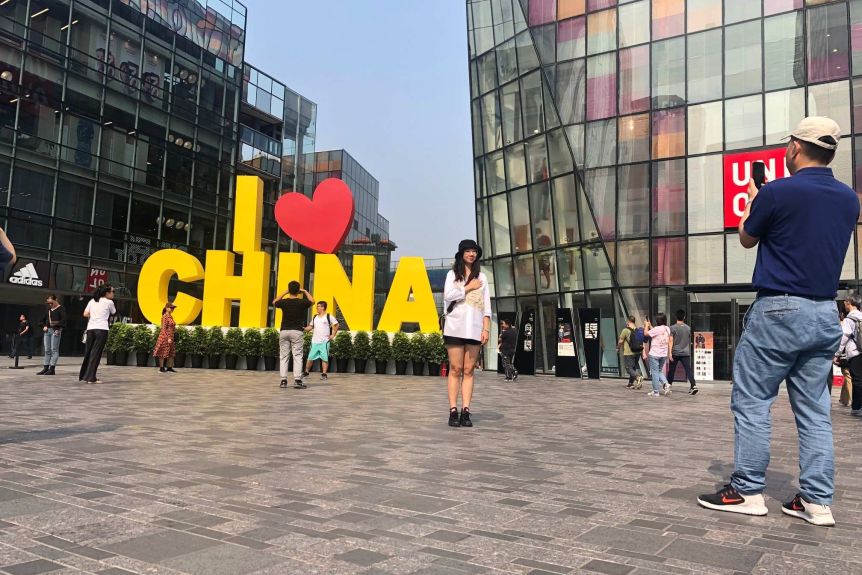
ABC News (Australia)
My research suggests that the CCP is much more likely to initiate aggressive foreign policy when it faces this sort of domestic unpopularity. The theory of diversionary foreign policy is that unpopular leaders face incentives to engage in aggressive foreign policy in order to generate a nationalist rally of support. If Xi Jinping is able to have a saber-rattling conflict with the United States or Japan, people are more likely to support him. This rally, in turn, discourages elites like Ren from challenging him.
On the American side, both presidential candidates face strong incentives to engage in China bashing, because recent poll data show that Republicans and Democrats alike have grown much more negative on China. I expect that we will see much more aggressive foreign policy towards China for this reason.
“We found that the level of Chinese public support for the CCP is only around 60%, definitely not the 90% concluded by many other surveys that used direct questioning.” – Erin Carter
“There have been no gestures or real open hand, and in fact, it seems that the latest speeches from the Trump administration are based on the presumption that talk would be fruitless.” – Susan Shirk
How do you evaluate the United States’ current policy towards China, and where are potential points of contention?
Shirk: In the last month, China’s foreign policy actions have included what I thought was actually a good speech by State Councilor and Foreign Minister Wang Yi, which demonstrated a desire to communicate and stabilize U.S.-China relations. The speech was dismissed by the Trump administration, and I haven’t seen any offers by [Secretary of State] Pompeo, [National Security Advisor] O’Brien, [FBI Director] Christopher Wray, and others to negotiate. There have been no gestures or real open hand, and in fact, it seems that the latest speeches from the Trump administration are based on the presumption that talk would be fruitless. Another way of putting that is it looks like the strategy of the Trump administration has basically given up on the possibility of getting China to moderate its actions or positions on different issues. I personally haven’t given up on that possibility, and do not think we have tested it adequately; we certainly haven’t tested it over the last four years.
Carter: The CCP propaganda apparatus has always liked to focus on perceived hypocrisies in American policy. Recently, it has focused on discrepancies between U.S. statements about promoting democracy and freedom and the rise of anti-Asian racism in the United States. The CCP uses U.S. policy flaws and changing standards as a key part in propaganda narratives. An interesting thing about propaganda is that citizens’ views on foreign policy are much more subject to change than their views on domestic policy. The CCP’s ability to influence citizens on international affairs issues through regime propaganda is therefore much greater. This underlines the point that U.S. policy towards China is very important, and should live up to American values.
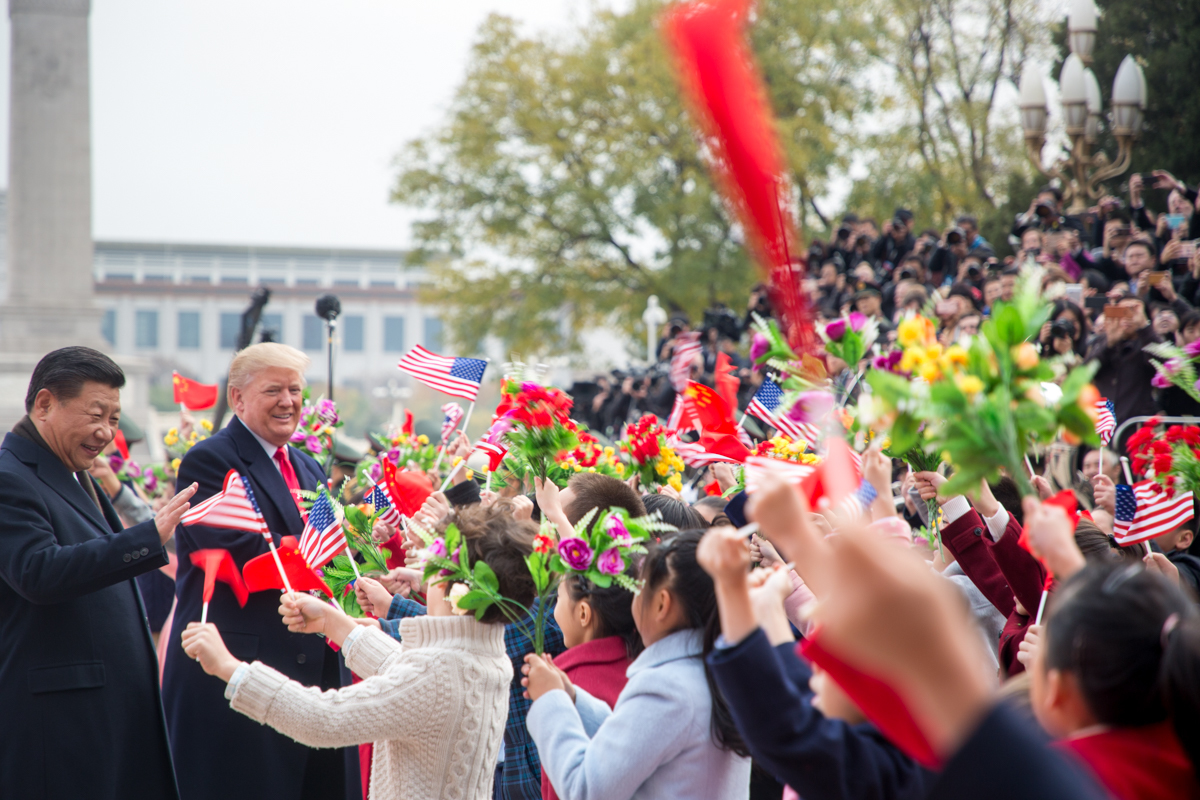
President Donald J. Trump and President Xi Jinping
meet children waving Chinese and U.S. flags at welcoming
ceremonies outside the Great Hall of the People,
Thursday, November 9, 2017, in Beijing, People’s Republic of China.
(Official White House Photo by Shealah Craighead)
If Chinese citizens find it more difficult to visit the U.S., and miss the opportunity to develop positive memories of the U.S. through cultural exchanges, this strengthens the effectiveness of CCP propaganda. Recent research shows that anti-Asian racism in the United States pushes Chinese citizens to support the CCP even more. If the U.S. doesn’t live up to its values, then that is a big problem for the United States’ ability to secure its goals globally.
Which would China prefer, another Trump administration or a new Biden administration?
Shirk: There are many people who say the Chinese leadership prefers Trump because he is mismanaging American foreign policy so badly that it creates an opening for China to become a global leader, but I actually think that a decent, constructive relationship with the U.S. is one of China’s most important core national interests. A bad relationship with the U.S. would be very costly to China. Therefore I think there is a decent chance that China would respond positively to a Biden administration, and that the two sides will be able to work some things out. I want to emphasize that there are some non-negotiable issues, such as China’s human rights problems including Xinjiang and Hong Kong. Yet I do think that through negotiations we could make progress on some issues related to economic policy, technology and even on maritime issues.
The United States needed to adjust our engagement policy [from the strategy used by the Clinton administration while I was in government] to address the way that China has changed since the mid-2000s under Hu Jintao and even more now under Xi Jinping’s leadership. However, what the Trump administration is doing is really extreme in my view. It is a “sledgehammer approach” of confronting China on every continent and every domain -- just confronting, but not actually accomplishing anything. What has the Trump administration accomplished? Other than the first phase of the trade deal, not much. I think a Biden administration will be more effective, more practical, less ideological. It will be willing to try to negotiate solutions to our key disputes as well as bolstering American economic and technological strength. A big difference here is that a Biden administration will work together with allies and like-minded countries to have a common position vis-a-vis the Chinese government’s problematic actions. The Trump administration acts unilaterally and has actually alienated international partners, and that's one reason why it has been so ineffective in influencing China.
How would other countries react to the U.S.-China rivalry?
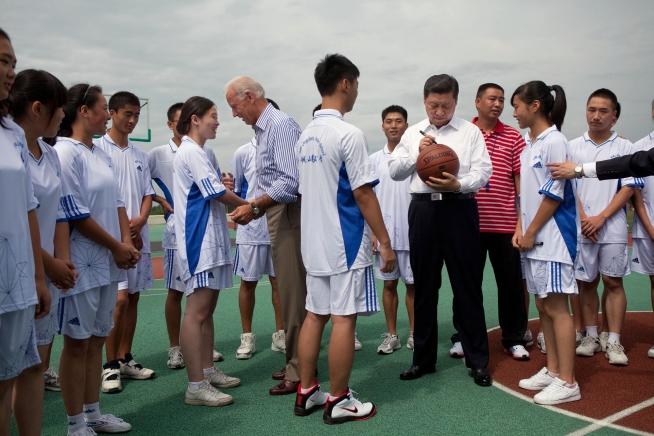
America Vice President Joe Biden and Chinese
Vice President Xi Jinping, Qingchengshan High School
in Dujiangyan, China, Aug. 21, 2011. The high school was severely
damaged in the 2008 Wenchuan earthquake and has since been
rebuilt. (Official White House Photo by David Lienemann)
Shirk: The Trump administration is using a very coercive approach to arm-twist U.S. allies, particularly in regard to Huawei. Huawei has become a symbol of the way to get at China, and the U.S. has used strong persuasion to convince other countries to reject Huawei in their 5G network. But most countries don't want to pick a side and prefer to have good relations with both China and the U.S., so this effort on the part of the U.S. to force the choice will not be completely successful. Some countries may make compromises according to the United States’ request, but they would really prefer to enjoy good relations with both countries, especially economic relations. China has more countries with whom it is the largest trading partner than the U.S. does. Most countries do not want to alienate their biggest trade partner.
When we asked our experts about their views on the reduced diplomatic interaction between the U.S. and China, and the potential dangers of mis- or non-communication, both raised the example of journalists. From a diplomatic perspective, how do you view the recent interactions between the United States and China?
Carter: The two countries have benefited enormously from [diplomatic] exchanges, including cultural, scientific, and person-to-person interactions. As someone who has spent a lot of time in China as a young person, student, and now as a professor, it's really sad to see those avenues of exchange closing.
Regarding journalistic exchanges, the Trump administration’s policies have tremendously hurt U.S. national interests through tit-for-tat behavior. Based ostensibly on Trump’s ejection of Chinese state media reporters, the Chinese government was able to revoke press credentials for a whole group of reporters–from the New York Times, Wall Street Journal, Washington Post, and other outlets–who had done tremendous reporting. These journalists were an incredibly valuable asset for understanding Chinese elite politics. If they are forced to operate out of Seoul or Taiwan, the world will understand far less about what is going on in Chinese elite politics.
Will decreased diplomatic interaction between the U.S. and China increase the possibility for the use of force?
Shirk: The lack of diplomatic communication is really a serious problem if dispute resolution is to take the form of negotiated solutions. It’s not just the recent closing of consulates; it’s that there really are no channels for the two sides to be discussing highly contentious issues. For example, take the issue of journalists. The [U.S. and China] have taken measures to try to reduce the number of the other country’s journalists stationed in each other’s countries. These actions have followed a tit-for-tat pattern. We should try to negotiate the issue of journalists’ access. Strict reciprocity, such as allowing the same number of journalists in each country, could work as it did during the US-Soviet Cold War.
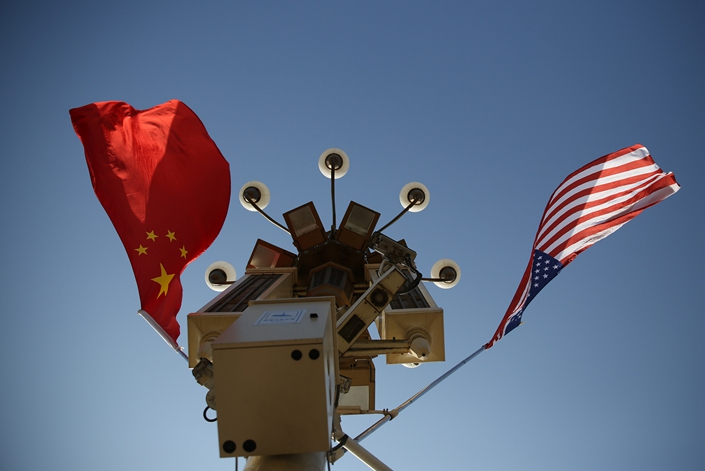 The problem is there has been no communication, so the two sides are just whacking at each other without showing any good will to work things out diplomatically. All of this is done very publicly, so both countries’ public opinion has become more negative towards the other country. This is a dangerous thing. The lack of sufficient and effective diplomatic interaction also creates risks for misunderstandings that could lead to military conflict. As American and Chinese ships and planes come into closer and closer proximity, particularly in the South China Sea, it is easy to imagine some kind of accidental encounter, followed by dangerous escalation.
The problem is there has been no communication, so the two sides are just whacking at each other without showing any good will to work things out diplomatically. All of this is done very publicly, so both countries’ public opinion has become more negative towards the other country. This is a dangerous thing. The lack of sufficient and effective diplomatic interaction also creates risks for misunderstandings that could lead to military conflict. As American and Chinese ships and planes come into closer and closer proximity, particularly in the South China Sea, it is easy to imagine some kind of accidental encounter, followed by dangerous escalation.


